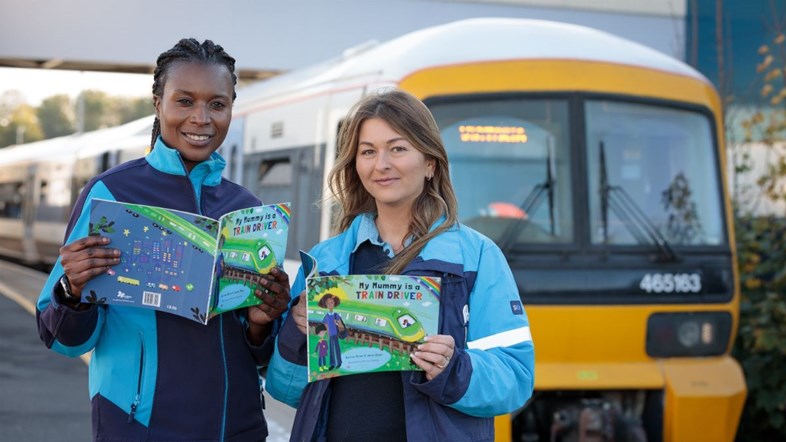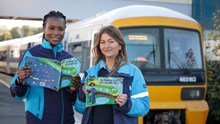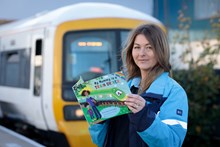‘My Mummy is a Train Driver’ is the latest in a series of books that challenge gender stereotypes. It aims to inspire young children to consider a future career in rail and to showcase the welcoming and inclusive work environment the rail industry continues to foster.
Sponsored by Southeastern and other train operating companies, the book is a culmination of the personal insights and perspectives of a diverse group of people working in the rail industry. Told through the eyes of a child, the reader learns what it takes to do the job safely, as well as the fun experiences encountered along the way.
Southeastern train driver Jane Fentaman, who lives in Rochester and is based at the Slade Green depot, said: “My children are quite proud of saying that their mother is a train driver. They like watching their friends’ reactions! But it does show how naturally surprising it is for children, open-minded as they are, to understand that women can be train drivers too.
“There is a lot that must be done to normalise this as a job that can be done competently, no matter what gender you might be. Children’s books can be a powerful way in which to communicate that.”
In the last five years, the number of female train drivers at Southeastern has more than doubled to 10 per cent and with women making up 20 per cent of the company’s 4,600-strong workforce overall.
Steve Foster, Director of People at Southeastern, said: “The rail industry in general is considered to be male dominated so it’s very important that we not only attract women to the company, but also support them to stay and flourish in their roles. This allows us to attract and retain the best possible talent. Being involved with ‘My Mummy is a train driver’ is a fantastic way to reach young children and influence them before gender stereotypes have set in.”
Southeastern is recognised as an Endorsed Employer for Women by WORK180, which approves employers with a genuine commitment to supporting women at work, making it easy for job seekers to find the UK’s best workplaces. Southeastern has also won the best place to work at the Women in Rail Awards in 2021 and 2022 and has been included in the Financial Times Diversity Leaders report.
Steve Foster added: “We know there is more to do but Southeastern works hard to provide a welcoming and inclusive culture. It’s encouraging to see our number of female drivers is rising every year and I hope ‘My Mummy is a train driver’ will mean a few more children will consider it as a career.”
The book is aimed at primary school aged children and is now available to buy from all good bookshops or from independent publishers www.butterflybooks.co.uk.
For more information on careers at Southeastern, visit www.southeasternrailway.co.uk/about-us/careers-at-southeastern.
CASE STUDY 1: LAUREN STOWERS
Lauren Stowers, 38, is a train driver for Southeastern on routes throughout Kent and London. She lives in Dartford and is mum to Zach, aged 7; Stanley, aged 4; and Hazel, aged 2.
My children have only ever known me to be a train driver, so it’s never occurred to them that I might be unusual. I’m simply their mummy doing her job – being a train driver.
This is really important to me because it means they’re growing up without a thought of perpetuating the stereotypes I regularly face: My children aren’t surprised that their small mum drives a train, or that a woman might be teaching a man to drive a train, and it would never occur to them to think I should instead be cleaning the train.
The railway is much more diverse than when I first started but gender misconceptions mean that more often than not, if I’m stood with a male colleague, the person approaching us will assume the man is the train driver.
I don’t let it get me down, I’m confident and experienced and I think that shows in my work. I’m mostly respected as much as a male driver because I give out respect to all staff, no matter their grade. Gender, sexual orientation, ethnicity, class, none of it matters so long as you can do the job well. I’d like to see a change in job application paperwork so the best person gets the job without any thought for those criteria, and I hope that when other women see me driving a train it encourages them to consider this as a career.
It was never my dream to become a train driver. I actually worked as a dental nurse and hoped to one day become a dentist, but the realities of life meant I needed to find a better paying job. Being a train driver enabled me to buy my first home.
I’ve been working on the railway for more than 16 years, and in that time being a woman has been the least significant challenge I’ve faced! I’ve juggled my career with health problems, disability, parenting, and more, but the important thing is that I’ve carried on. That’s not because I’m a woman or have a point to prove, it’s because I’m an average person who is determined to do a good job.
Average people inspire me – in fact anyone who has gone through hardship and still gets out of bed every day and carries on despite everything they are feeling. Many people don’t realise how challenging that can be.
If I had one piece of advice to share with anyone considering a job as a train driver it would be to just do it and don’t worry what anyone thinks. When I was training an assessor told me: “Show them who’s boss because I absolutely believe you can do it!” That belief and showing a confident face to the world makes all the difference.
CASE STUDY 2: JANE FENTAMAN
Southeastern train driver Jane Fentaman, 41, lives in Rochester and is based at the Slade Green depot. She is mum to Tramaine, aged 14, Alan, aged 12 and Natalie, aged 9.
In 2006 I became the first female shunter driver Southeastern trains had ever recruited. Firstly, shunting was a very difficult role especially with the rolling stock at that time. So roles like this were perceived as a man’s job. And secondly it required physical work, for example pulling points. I loved the job, even if it just entailed me driving from the sidings to the station or moving the stock around in the yard.
Soon afterwards, I knew I wanted to become a fully-fledged train driver. I love the responsibility and control. I am a people watcher – I feel a sincere sense of satisfaction when I arrive at the station and I see people coming out of the train after a very long day, knowing I got them home safely to their families.
My plans for progression were, however, delayed. I fell pregnant with my first child and had to leave my job in order to raise my young family as a single parent. It actually took me 10 years and five tries before I finally got recruited as a mainline railway driver. I struggle with dyslexia and had to rewrite my notes every evening in order to help me understand and absorb information better. It certainly felt as if I had to work ten times harder than my peers just to achieve the same thing.
I was originally born in Zambia and come from a family of six girls. Both my parents were professionals. My mother has two degrees: one in law and the other in social work. My father had a PhD. They may have wanted similar plans for me, but things changed drastically when my dad passed away when I was nine years old and, as I grew older, I became a carer for my mother who suffered from severe depression.
Consequently, I didn’t have much schooling. Apart from sitting the 11+ exams, I have had no secondary school education. Caring for my mother and my two siblings took precedence over this. I taught myself how to use a computer, cook, clean and cope with the pressures of daily life. I eventually got a job as a carer and qualified for GCSEs at night school.
Having worked in the rail industry for just over 10 years, I’m very aware that there are lots of misconceptions about women train drivers. It’s progress to see that women are now in roles like this. However, change should have happened years ago. Women are very capable and it astounds me that it has taken as long as it has to get to where we are today.
I have never really experienced hostility or prejudice in my role, and perhaps that makes me one of the ‘lucky’ ones. But these things are commonplace in work environments where women are in the minority. Whenever I say that I’m a train driver, people are totally surprised, impressed and even envious! I’ve had female customers on the train stop me and say how impressed they are and how wonderful it is to see a female driver.
For me, this is normality but, for everyone else, it must be an unusual if refreshing sight. It does feel great that I’m breaking the norm. Every day I feel privileged and grateful for being in a job that I love. I’m sure not many people get to say that.
My children are also quite proud of saying that their mother is a train driver. They like watching their friends’ reactions! But it does show how naturally surprising it is for children, open-minded as they are, to understand that women can be train drivers too.
There is a lot that must be done to normalise this as a job that can be done competently, no matter what gender you might be. Children’s books can be a powerful way in which to communicate that.
Although change is happening within the railway sector so that there are more women than ever before in the workforce, I think more needs to be done to support employees with young families as well as those who also act as carers – as these are typically women. This could mean more flexible shifts, granting ‘normal’ annual leave and seeing more women supported in director positions. I am happy that positive change in terms of diversity is happening though. Let’s see what the future holds.
ENDS



